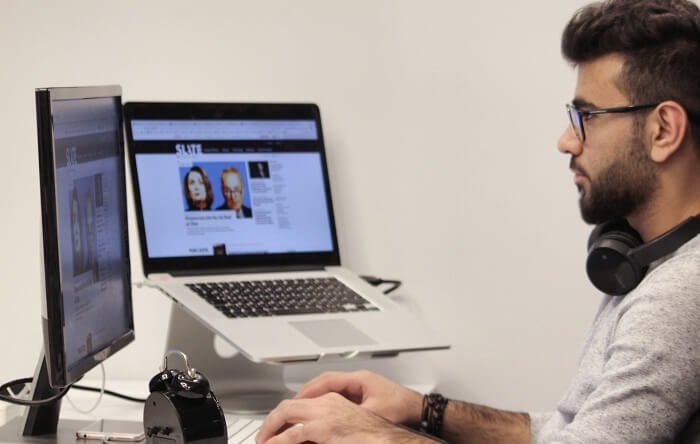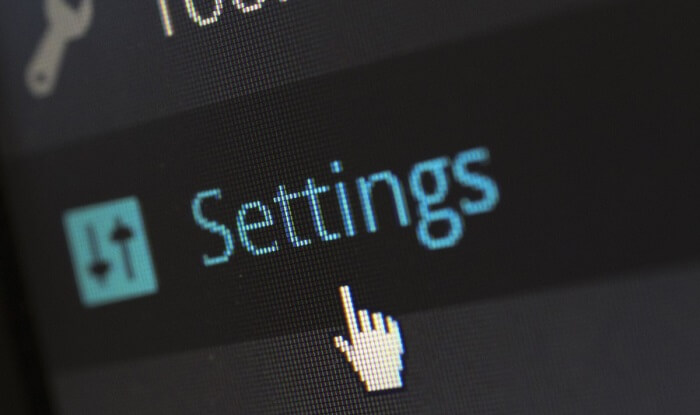Many people are turning to blue light glasses for relief with eye strain and to support their sleep. But do blue light glasses work, or are they just another gadget that offers false promises?
Let’s take a look at what blue light is, how blue light glasses work, and what the research says on the topic.
What is blue light and is it harmful?
Did you know that visible light is actually made up of a wide spectrum of different wavelengths? Blue light is one of the many different colors on that spectrum of light. It has the shortest wavelength and the highest energy compared to the other colors on the spectrum. Red light, in comparison, has long wavelengths and low energy.
Sunlight is the biggest natural source of blue light, but there are also artificial sources as well. Digital devices like our phones, TVs, and computers emit blue light.1
During the day, blue light can be helpful for keeping us alert, in a good mood, reacting quickly, and thinking clearly. This is when we would naturally be exposed to blue light from the sun. But light of any kind at night throws off your body’s 24-hour biological clock, also known as your circadian rhythm. And it turns out that blue light, in particular, is especially harmful. Blue light exposure at night can interfere with the secretion of melatonin, a hormone that helps you sleep.2
However, there is conflicting evidence on this subject, and some recent studies have suggested that yellow light is actually more disruptive of sleep patterns than blue light.3
There is also concern that blue light can be harmful to eye health, as the eye is not good at blocking out blue light. Blue light also scatters more easily than other colors of light and can lead to unfocused “noise” when we are looking at digital devices, which may contribute to eye strain.4 Despite the concern about blue light and your eyes, however, there is not very much scientific evidence to suggest that blue light is actually a threat to eye health.1
What are blue light glasses?

Blue light glasses use special lenses to specifically filter out blue wavelengths of light. Depending on how they are made, the lenses in these glasses can appear amber colored or clear and colorless.
The idea with blue light glasses is that no blue light will reach your eyes, or at least only a small amount will. You will still be able to see clearly and go about your work or your daily life otherwise unaffected, but you won’t be exposing yourself to so much blue light.
Blue light-blocking glasses are sometimes called “computer glasses.” They also often reduce glare that comes from screens.
Do blue light glasses work?
More and more people are using them, but do blue light glasses work and is there scientific evidence to support their effectiveness? Let’s take a look at the research on the benefits of blue light glasses for both sleep and eye health.
Blue light-blocking glasses for sleep
When it comes to sleep, blue light glasses might be worth your while. Several small studies have suggested that wearing glasses that filter out blue light can be useful for reducing insomnia, allowing you to fall asleep faster, and otherwise helping you to sleep better.5 6 7
Recent findings from a 2020 study published in the Journal of Applied Psychology, for example, concluded that blue light glasses worn before bed are an effective way to improve sleep at night and boost work productivity during the day. The positive results were particularly strong for people who are “night owls.”5
Experts believe these beneficial effects occur because blue light suppresses melatonin production; blue light-blocking glasses can prevent this from happening so that melatonin can function naturally.8
Blue light-blocking glasses for eye health
It turns out that there isn’t a lot of good quality research to suggest that blue light glasses actually protect your eyes or have benefits for eye health.9
That being said, there is lot of anecdotal evidence of people reporting less eye strain and eye fatigue when they use blue light-blocking glasses.1 So while the scientific research doesn’t support the need for blue light-blocking glasses to protect eyes from digital devices, it is ultimately up to you to see if they are helpful or not.
Many researchers believe that most of the problems with digital devices aren’t directly related to blue light, but more to how we use our devices. Or perhaps more accurately, how we overuse our devices. Staring at screens for long periods of time without breaks, sitting too close to a computer screen, and using devices on full brightness, for example, can all be problematic and contribute to problems like eye strain.1 2
Tips for limiting blue light and other harmful effects of screens

If you are worried about the effects of blue lights and digital screen exposure, you may consider trying out blue light glasses. But there are a lot of options available to you other than special blue light glasses.
Here are other tips to help:
- Change your screen settings. Most devices have adjustable settings for brightness and for tones of light. Turn down both the blue light and the brightness of your phone, tablet, computer, and TV. In many cases, there may be a “night mode” that automatically makes your screen less harsh on the eyes when evening hits.
- Try an app. Apps like f.lux adjust your computer display to match your circadian rhythm. When the sun goes down, you’ll notice your screen automatically warming up in tone with a reduction in blue light.
- Adjust your seating. Many people sit too close to their computer screens. You should be about two feet away.
- Try the 20-20-20 rule during the day. Constantly staring at a screen right in front of you can be very harmful. Every 20 minutes, take a 20 second break to look at something 20 feet away from you to give your eyes a break.1
- Reduce your screen time. While you can use glasses and adjusted screen settings to reduce blue light exposure, your best bet is to cut back on your screen time in general. In addition to limiting blue light, there are many other advantages to getting away from screens, too. Try not looking at your phone, watching TV, or using your laptop for at least an hour before bed to support both your eyes and your sleep quality.1 It might take a lot of discipline, but two to three hours before bed is even better if you can manage it.2
- Consider using dim red lighting for night lights. Red light is less likely to impact your circadian rhythm and sleep patterns.2
Blue light glasses may benefit your sleep and eye health
There’s some controversy over whether blue light glasses are worth the hype. While the evidence isn’t strong that blue light actually harms your eye health, we do know that exposure to blue lights at night can interfere with good quality sleep.
Some people do find that blue light-blocking glasses allow them to spend more time on their screens more comfortably, and that the glasses help them sleep better at night. But not everyone agrees, so ultimately you have to see if they work for you.
Whether you opt to give blue light-blocking glasses a try or not, there are several other tips and tricks that can help you make healthier choices when it comes to using your digital devices. Ultimately, it comes down to this: reduce your screen time if you can. And try to reserve blue light exposure for during the day.2
Getting away from your digital devices will not only help you limit blue light, but will also allow you more time with your family, a chance to unplug from work or social media, and an opportunity to be more present in the moment.
 About Chelsea Clark
About Chelsea Clark
Chelsea Clark is a writer and certified health and wellness coach who is passionate about supporting others along their own health journeys. She enjoys helping people make positive, lasting changes so that they can live the happiest, healthiest life possible.
Sources:
1. Farooq, A.V. “Do you need blue light-blocking glasses?” The University of Chicago Medical Center. Uchicachomedicine.org.
2. “Blue light has a dark side.” Harvard University. Health.harvard.edu.
3. Mouland, J.W., F. Martial, et al. “Cones Support Alignment to an Inconsistent World by Suppressing Mouse Circadian Responses to the Blue Colors Associated with Twilight.” Current Biology 29, no. 24 (2019): 4260–4267.e4.
4. “Is blue light from your cell phone, TV bad for your health?” UC Davis Health. Health.ucdavis.edu.
5. Guarana, C. L., C.M. Barnes, & W.J. Ong. “The effects of blue-light filtration on sleep and work outcomes.” The Journal of Applied Psychology (2020): Online ahead of print.
6. Janků, K., M. Šmotek, et al. “Block the light and sleep well: Evening blue light filtration as a part of cognitive behavioral therapy for insomnia.” Chronobiology International 37, no. 2 (2020): 248–259.
7. Knufinke, M., A. Nieuwenhuys, et al. “Dim light, sleep tight, and wake up bright – Sleep optimization in athletes by means of light regulation.” European Journal of Sport Science (2019): 1–9.
8. Sasseville, A., N. Paquet, et al. “Blue blocker glasses impede the capacity of bright light to suppress melatonin production.” Journal of Pineal Research 41, no. 1 (2006): 73–78.
9. Downie, L.E., R. Wormald, et al. “Analysis of a Systematic Review About Blue Light-Filtering Intraocular Lenses for Retinal Protection: Understanding the Limitations of the Evidence.” JAMA Ophthalmology 137, no. 6 (2019): 694–697.